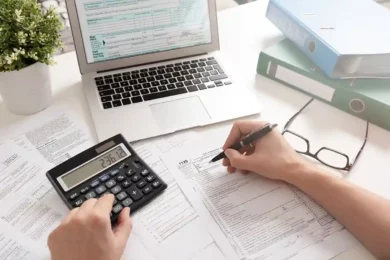Filing taxes is probably something that most people don’t look forward to. However, it’s often beneficial: on average, most employees in Germany receive an average tax refund of around €1,000 each year. This money is yours, and without a tax declaration, it would stay with the government. Here’s everything you need to know about income tax returns.
Why do you need a tax return?
A tax return helps determine if the taxes you’ve paid during the tax year align with your actual tax liability. If you overpaid, you get a tax refund. If you underpaid, you’ll need to pay the difference. In Germany, it’s less common for most employees to underpay. Your actual tax liability can differ from the taxes you’ve paid due to expenses during the year that can reduce your taxable income. Tax deductions can include work-related expenses, church taxes, and insurance contributions, all of which can decrease your tax bill.
Besides employees and the self-employed, pensioners are also often required to submit a tax return. Nearly five million pensioners receive pensions high enough to necessitate a tax declaration. Fortunately, many employees can manage their tax returns independently. As data tends to remain consistent year-to-year, the initial tax filing might demand more effort. However, in the following years, much of the information can be reused with minor adjustments.
In which cases is a tax return necessary and useful?
Approximately 50% of all taxpayers need to submit a tax return in Germany. If you’re an employee, the payroll tax gets deducted from your monthly salary. Technically, you might not have to file a tax return. However, many find it beneficial to do so.
According to Section 46 of the Income Tax Act, you must file an income tax return if there’s an income tax allowance on your tax card. However, this rule doesn’t apply if the allowance is a lump sum for disabled individuals or survivors.
If you earn less than €11,600 annually as an individual or less than €22,050 as a married couple with combined taxation, you’re not obligated to file a tax return in Germany. But if you get wage replacement benefits like unemployment benefits, short-time work allowances, parental allowance, or sick pay, you must submit a tax declaration. Those in tax class 5 are also required to do so. Similarly, if you’ve received a severance package during the assessment period, you’ll need to submit a tax return.
Any self-employed person, tradesperson, farmer, landlord, or pensioner with an income surpassing the standard tax allowance should also file a tax return in Germany.
Even if you’re not mandated to file a tax declaration, it’s often beneficial to do so. Employees who file a tax return voluntarily can get a tax refund they didn’t anticipate, especially if they have considerable work-related expenses. For instance, commuting costs can be a factor. While every employee has a lump sum of €1,000, this might not be enough for many. Special expenses like paid church taxes, social security expenditures, retirement contributions, donations, or childcare costs can be deducted. These often result in a lowered tax liability and a tax refund.
Remember, the expenses mentioned here are just a few examples. There are other costs incurred throughout the year that you might be able to include in your German tax return.
What types of tax returns exist in Germany?
While many associate the term “tax return” primarily with income tax, there are other types of tax returns taxpayers must be aware of.
For instance, an inheritance tax return is often required when the tax office learns of an inheritance. Similarly, a gift tax return becomes applicable when assets are transferred while you’re alive. Business owners must submit a trade tax return; if a business operates as a corporation, a cooperative, or an association, a corporate tax return is necessary. Furthermore, entrepreneurs might need to file a sales tax return if their goods or services are subject to VAT.
How to file a tax return with ELSTER?
ELSTER stands for “Electronic Tax Return”. It’s a digital platform for submitting tax returns to the tax office in Germany. To ensure the safe transmission of data, a certificate is needed, which can be obtained from the local tax office. You can set this up by creating an account at www.elster.de.
On the website, using the MeinELSTER form, you can submit your tax return online. If you haven’t yet registered with MeinELSTER, we recommend you to do so to make your future tax filing easier. The ELSTER system is designed to be user-friendly, even for those new to the process. Once you’ve input your data for a tax year, most of it can be reused in the next years. If there are updates, the system will provide a reference to your tax return from the previous year, serving as a helpful guide.
Tax return forms
A German tax return is composed of a main form that every taxpayer needs to complete. Along with this, there are different attachments that should be filled out if you have incurred related expenses. Specific forms exist for listing special expenses and household-related expenses. For children, there’s a designated form, and a separate one is needed for each child.
Attachments to the tax return include:
- Appendix N for full-time job employees
- Appendix S for self-employed individuals and freelancers
- Appendix G for traders
- Appendix R for pensioners
- Appendix V for rental income
- Appendix EÜR for the income surplus statement for freelancers
Tax return filing deadline
The tax returns for the previous year must be submitted by July 31 of the current year. However, if you’re collaborating with a tax advisor or a tax consultant, the filing deadline extends to March 1 of the following year. After submitting your German tax return, expect 2–6 months to receive a tax assessment.
If the deadline cannot be met, you can request an extension from the local tax office. This request has to be in writing, explaining the reason for the delay and suggesting a new submission date. However, receiving an extension from the tax office isn’t guaranteed.
Conclusion
While many taxpayers might hesitate to deal with their tax return because of its complexities, it’s important to submit it to the tax office. If you’re an employee, there’s a risk of not claiming potential tax deductions or tax refunds, leading to unnecessary pay taxes in excess. With the German tax system offering online tools like MeinELSTER, completing your annual income tax return becomes more quick and secure. Always remember, understanding your tax liability can benefit you eventually.
Frequently Asked Questions
A tax ID number is a unique identifier assigned by the local tax office to each taxpayer in Germany. It helps the authorities track and manage taxes and tax returns for individuals.
Yes, if you have additional income beyond your full-time job, such as from a rental property or a new business, you need to declare it in your tax declaration. This ensures accurate tax assessment of your total earnings.
Germany has treaties with many EU countries to prevent double taxation. It ensures you don’t pay taxes on the same income in both countries. Consult a tax consultant or tax advisor to understand the specifics and ensure proper filing.
Yes, if you run your own business, the income you earn is subject to taxable income regulations in Germany. Ensure you track all revenues and expenses and consider seeking advice from a tax consultant for accurate tax filing.
If you’ve had more than one employer in the same year, it might influence your tax return and tax liability. Ensure you provide details of all your employment and associated income when preparing your tax declaration to get an accurate tax assessment.



